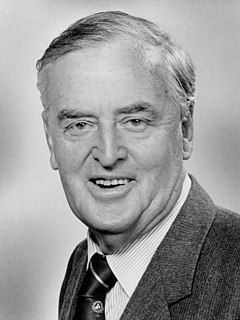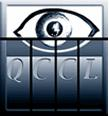Related Research Articles

Sir Johannes Bjelke-Petersen was an Australian politician. He was the longest-serving and longest-lived premier of Queensland, holding office from 1968 to 1987, during which time the state underwent considerable economic development. He has become one of the most well-known and controversial figures of 20th-century Australian politics because of his uncompromising conservatism, political longevity, and the institutional corruption that became synonymous with his later leadership.
The Joh for Canberra campaign, initially known as the Joh for PM campaign, was an attempt by Queensland National Party premier Sir Joh Bjelke-Petersen to become Prime Minister of Australia. The campaign was announced in January 1987 and drew substantial support from Queensland businessmen and some conservative politicians. The campaign caused a split in the federal Coalition. It did not attract widespread support and collapsed in June 1987. The Australian Labor Party, led by Bob Hawke, went on to win by an increased majority in the 1987 federal election, gaining its highest-ever number of seats. Bjelke-Petersen came under increasing scrutiny as the Fitzgerald Inquiry gained traction, and was forced out of politics altogether in December 1987.
The Commission of Inquiry into Possible Illegal Activities and Associated Police Misconduct into Queensland Police corruption was a judicial inquiry presided over by Tony Fitzgerald QC. The inquiry resulted in the resignation of Queensland's premier, Joh Bjelke-Petersen, the calling of two by-elections, the jailing of three former ministers and the Police Commissioner. It also contributed to the end of the National Party of Australia's 32-year run as the governing political party in Queensland.
Theo Russell Cooper is a former Australian National Party politician. He was Premier of Queensland for a period of 73 days, from 25 September 1989 to 7 December 1989. His loss at the state election of 1989 ended 32 years of continuous National Party rule over Queensland.

Michael John Ahern is a former Queensland National Party politician who was Premier of Queensland from December 1987 to September 1989. After a long career in the government of Sir Joh Bjelke-Petersen, Ahern became his successor amid the controversy caused by the Fitzgerald Inquiry into official corruption. Ahern's consensus style and political moderation contrasted strongly with Bjelke-Petersen's leadership, but he could not escape the division and strife caused by his predecessor's downfall.

Florence Isabel Bjelke-Petersen was an Australian politician and writer. She was a member of the Australian Senate from 1981 to 1993, and was the wife of the longest-serving Premier of Queensland, Sir Joh Bjelke-Petersen. She was styled as Lady Bjelke-Petersen upon her husband's knighthood, and was also known informally as Lady Flo.
Terence Murray Lewis, GM is a former Commissioner of the Queensland Police Service who was convicted and jailed for corruption and forgery as a result of the Fitzgerald Inquiry. He was stripped of his knighthood and two other awards in consequence.

Sir Walter Benjamin Campbell, was an Australian judge, administrator and governor. He was the Chief Justice of the Supreme Court of Queensland, Chancellor of the University of Queensland, and the 21st Governor of Queensland from 1985 to 1992.
George Georges was a Labor senator for Queensland from 1968 to 1986, and independent senator from 1986 to 1987.
The following lists events that happened during 1987 in Australia.
Donald Frederick Lane was a Minister of Transport in the Bjelke-Petersen state of Queensland's coalition government. A former policeman in the Special Branch, in 1971 he was elected as the Liberal member for Merthyr, an electorate which included the Fortitude Valley where a lot of the then illegal brothels and casinos were located. During his time with the Police, he had gotten to know Jack Herbert the Chief Organiser of The Joke, and the "Rat Pack" of Terry Lewis, Tony Murphy and Glenn Hallahan well. Following the 1983 Queensland state election he switched to the National Party, providing it with an outright majority, and was rewarded with a ministry. He went on to lead the National Party’s submission to the Electoral Commission to more effectively gerrymander and malapportion seats to increase National Party control. It was revealed in the Fitzgerald Inquiry, that Lane had significant unexplained income, and was alleged by Jack Herbert to have taken bribes. Lane didn’t admit to taking bribes, instead he admitted to abusing Ministerial expenses and claimed a lot of other Ministers had done the same. In the end Lane and three other Bjelke-Petersen ministers were tried in the District Court and sentenced to twelve months imprisonment for falsifying their expense accounts.

Raymond Wells Whitrod, was an Australian police officer and criminologist. He was considered a world leader in the way society treats victims of crime. He was known as a man of high professional standards, with a commitment to justice, equity and integrity. He became best known for his term as Commissioner of the Queensland Police Service, resigning in protest in 1976 at the corruption then endemic in Queensland, and in particular over the appointment by the Premier of Queensland, Joh Bjelke-Petersen, of Terry Lewis as Assistant Commissioner.
Terrence Anthony "Terry" White is an Australian pharmacist, businessman, and former politician. White achieved notoriety when, as Queensland state leader of the Liberal Party he terminated the longstanding coalition agreement between the Liberal Party and the National Party of Joh Bjelke-Petersen. In the ensuing election, the Liberals were badly defeated, and White was replaced as party leader. After leaving politics, he established a nationwide chain of pharmacies using a franchise model and became a widely respected businessman.

The Queensland Council for Civil Liberties (QCCL) is a voluntary organisation in Australia concerned with the protection of individual rights and civil liberties. It was founded in 1966 in order "to protect and promote the human rights and freedoms of Queensland citizens." The QCCL is regularly asked by the Government to make submissions to committees, which is how bills are made in Parliament. These submissions cover issues such as closed circuit television, abortion law reform, sentencing issues in our court system and changes to legislation already in place, which are called amendments.

The Cane Toad Times was a satirical humour magazine based in Brisbane, Queensland. It was first published in the late 1970s, then revived under the same name by a new team from 1983–1990.
The Lucas Inquiry, chaired by Justice G. A. G. Lucas, began in 1976 and was constituted to look into police corruption in Queensland, but the Inquiry was seriously flawed, reliant as it was, on its star witness Jack Herbert, The Bagman who confessed at the later Fitzgerald Inquiry to organised corruption for almost his entire career within the Police Force and afterwards. It was prompted by the Queensland Council for Civil Liberties, along with the Queensland Law Society, who demanded an inquiry into police corruption. Justice Lucas took evidence from Jack Herbert and listened to tapes made by Senior Constable Frank Davey, a friend of the corrupt Bagman, Herbert, but didn’t interview the honest cops who were the subject of the allegations.
Colin Charles Lamont was an Australian politician. He was a Liberal Party member of the Legislative Assembly of Queensland from 1974 until 1977, representing the electorate of South Brisbane.

The National Party of Australia – Queensland (NPA-Q), commonly known as Queensland Nationals, or the National Party of Queensland, was the Queensland-state branch of the National Party of Australia (NPA) until 2008. Prior to 1974, it was known as the Country Party.

The Liberal Party of Australia , branded as Liberal Queensland, was the Queensland division of the Liberal Party of Australia until 2008.
Philip John Dickie is an Australian journalist.
References
- ↑ "Civil Libertarian and Criminal Lawyer Terry O'Gorman" ABC Local conversations with Richard Fidler 7 Aug 2008. Abc.net.au. Web. 7 May. 2012
- ↑ "Policeman John "Bluey" O'Gorman :: ABC Queensland". Abc.net.au. Retrieved 10 July 2013.
- ↑ 612 ABC Brisbane Civil libertarian and Criminal lawyer Terry O'Gorman
- ↑ ABC the World today Push for tagging of asylum seekers, Reporter: Joe O'Brien
- ↑ Sydney Morning Herald Smartcard plan sparks privacy fears 21 April 2005
- ↑ goldcoast.com.au News Gold Coast Gold Coast go card privacy warning Jessica Johnston | 30 July 2010
- ↑ ABC Stateline deaths in custody in Qld
- 1 2 Brisbane Times Police watching where you Go, Sean Baugmart
- ↑ Brisbane Times Atkinson to ask privacy commissioner not to cut access to Go Cards, Courtney Trnwith
- ↑ Robertson O'Gorman Solicitors Terry O’Gorman Archived 17 February 2011 at the Wayback Machine